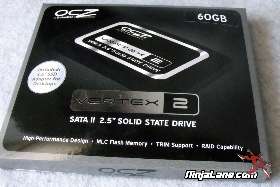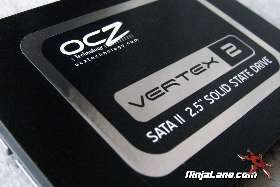After careful consideration I have decided to transfer all hardware review activities to a new domain. I purchased Hardwareasylum.com in 2012 and have been working hard to build a new and improved Ninjalane on that domain. If you are reading this you have reached one of the archived articles, news, projects and/or reviews that were left behind during the site migration.
Please update your bookmarks and be sure to visit the new and improved Ninjalane at Hardwareasylum.com
OCZ Vertex 2 60GB SSD Review
Author: Jim Manis
Published: Tuesday, October 05, 2010
Introduction
SSDs are still a relatively new technology that has been growing into a mainstream product offering. Early adopters of the technology are largely responsible for the speed and growth of the SSD market. OCZ was one of the first companies to embrace the new technology and have since become quite successful. So much in fact they have expanded into the arena of PCI Express SSDs and even developed a proprietary high speed connection interface called HSDL (High Speed Data Link) which is designed to eliminate I/O bottlenecks and allow SSD technology to operate as it was intended.
The OCZ Vertex 2 we have in the lab today is one of their latest models featuring the popular high speed Sandforce controller and high performance MLC flash memory. It is rated at a 285MB/s read and 275MB/s write with sustained writes of up to 250MB/s.
The OCZ Vertex 2 we have in the lab today is one of their latest models featuring the popular high speed Sandforce controller and high performance MLC flash memory. It is rated at a 285MB/s read and 275MB/s write with sustained writes of up to 250MB/s.
Solid State Disk (SSD) drives have come a long way in just a short couple of years, with recent technology advances they have become faster, have more capacity and are even more affordable. We had samples of the early SSD drives which quickly surpassed even the fastest rotational drives by a healthy margin.
The latest generation drives from OCZ have made major advancements over these early designs in both speed and reliability. In the next several pages we will put the OCZ Vertex 2 through our suite of benches and see how this new drive stacks up against other drives including an first generation SSD Raid 0 array.
The latest generation drives from OCZ have made major advancements over these early designs in both speed and reliability. In the next several pages we will put the OCZ Vertex 2 through our suite of benches and see how this new drive stacks up against other drives including an first generation SSD Raid 0 array.



